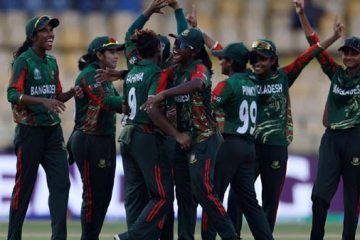When the Bangladesh Cricket Board (BCB) agreed not to host Test matches against New Zealand late last year, they voluntarily signed up for a day like Sunday.
On top of their reluctance to play Test cricket for 14 months, the BCB already has a problematic first-class structure in place. If one is to look at causes for this poor performance in Harare, it is far wiser to go back to the drawing board than putting heads on the chopping block.
Bangladesh were far behind the eight-ball on the fourth day of the one-off Test against Zimbabwe after fighting back twice, with the ball, in the preceding days of the game.
On the fourth day, the Tigers had to bowl out the hosts to regain control of the game but a sparkling maiden century by Brendan Taylor and Tatenda Taibu’s dogged approach eliminated any possibility for the visitors to force anything on the Zimbabweans.
Instead, a team that hasn’t played Test cricket for six years looked the more vivacious, more prepared and of course, the better side on show. The Tigers, as usual, had their moments. Robiul Islam’s marathon spell on the second day brought them back in the game while the three half-centuries by Shahriar Nafees, Mohammad Ashraful and Shakib Al Hasan promised much but yielded little.
It is hard to find faults in the Tigers’ preparation ahead of the Test series. They had a month-long fitness training camp while also holding a skills camp that included several two-day games. As far as summer tours are concerned, this was a far better prepared team than in previous years.
For example, the Bangladesh team were confined to indoor net sessions before one of their tours to Sri Lanka during the monsoon season.
So two questions pop up, naturally.
One, why didn’t the Tigers play Test cricket for so long?
The explanation given by the BCB at the time they cancelled the New Zealand Tests was that since the World Cup was on the horizon and the most important tournament for them at the time, one-day cricket was the order of the day.
So much so, they refused to hold the National Cricket League’s first-class competition after just a single game back in October, shelving it in favour of one-day cricket.
The second question that has often been asked in the past week: why has Zimbabwe looked so much more prepared than the Tigers?
The home side had the advantage of a dry season when they hosted South Africa A and Australia A.
But what everyone relates to is the franchise system in Zimbabwe. It has produced the likes of Tino Mawoyo, Craig Ervine, Kyle Jarvis and Brian Vitori already and has secured the future of many more.
After the trouble in the mid 2000s, Zimbabwe cricket hit a wall but after the franchise system was put into place where players were contracted and paid monthly, things started to brighten. The recent gripe that Taibu voiced was with the Zimbabwe Cricket, who didn’t pay the players properly. It is the five-team domestic competitions that has become the heart-beat of cricket in the country.
A similar system is also in place in Bangladesh, as everyone is aware, but unlike Zimbabwe, the BCB has placed less priority on first-class cricket.
For all the bad press that India has gathered due to the IPL, their cricket board has done the cunning thing. They have redirected some of the cash they earn from the IPL into their Ranji Trophy teams. Players have financial security and more quality performers are produced.
On the flip side, Australia are now struggling in international cricket, and this problem is directly related to their board prioritising Twenty20 cricket more than the first-class system.
-With The Daily Star input




















